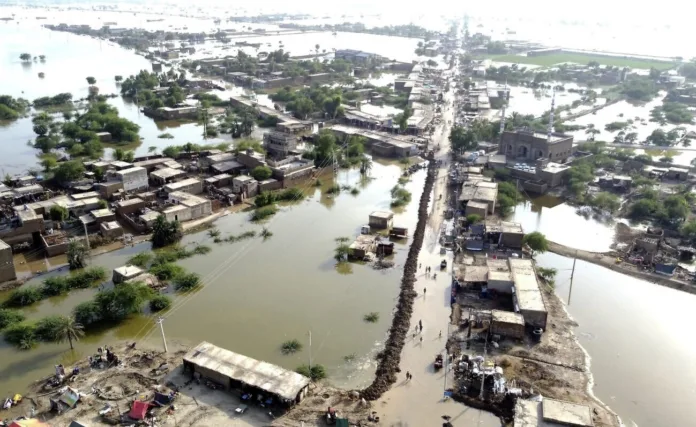✍ Areesha Nisar – Pakistan
As the global players, institutions and organizations are increasingly failing in meeting climate change targets, the need for regional leaders, organizations and countries to take lead in countering climate change has become more urgent. The withdrawal of America from Paris Agreement, closing of USAID and China’s ranking as largest global emitter are few of the main bottlenecks in meeting global climate goals and targets. Economic Cooperation Organization is emerging as leading regional platform in countering climate change.
The ECO region, comprises ten distant yet interrelated member states. It confronts a series of collective climate challenges that jeopardize climate prosperity and regional stability. These include water scarcity, glacial melting, an increasing incident of floods and droughts, and desertification. Nevertheless, ECO is equipped with institutional framework such as ECO Directorate for Energy, minerals and Environment (ECO EME), ECO Women Forum, and the ECO forum on Sustainable Development, which provides mechanism for data exchange, capacity enhancement, and coordinated policy initiatives.
To mitigate these escalating threats, member states must mobilize and fortify these frameworks with substantial political will, improved coordination, and regional financial support mechanism. Establishing a regional ECO Green Fund, fostering greater collaboration with global climate finance entities, and aligning with Paris Agreement and Sustainable Development goals 13 can expedite the enhancement of climate resilience. Crucially, ECO must present a unified stance in international climate platforms such as Conference of the Parties (COPs) to underscore the region’s common vulnerabilities and advocate for equitable climate financing, technology transfer and climate justice.
The ECO region holds substantial potential in renewable energy, particularly in solar, wind, and hydropower. Nations such as Iran, Pakistan, Turkiye and Central Asian Republics are blessed with immense renewable resources that has the potential to catalyze a regional transition towards green energy. However, the deeply routed reliance on hydrocarbons is a challenge to realization of this potential. As reported by IAE, fossil fuels continue to constitute over 80% of the energy portfolio in world economies, while investment in renewable energy remains minimal. A transition to green energy requires creation of an ECO Renewable Energy Cooperation Mechanism to facilitate collaborative infrastructure initiatives and pool investment and clean technologies. Turkiye aspiring to be a regional player can incorporate this initiative in its recent pipeline project with Syria promoting green energy and building climate resilience.
The ECO region’s shared geography and climate sensitive economies make it highly vulnerable to climate change impacts. Turkiye and Azerbaijan are facing rising urban heatwaves, forest fires, and extreme rainfall. For the Islamic Republic of Pakistan, this strategic pivot could not be more opportune given the current exigencies .Pakistan and Afghanistan ranks among the most climate vulnerable countries worldwide, Pakistan not withstanding its contribution of 0.9 in global greenhouse gas emissions. The devastating floods of 2022 resulted in displacement of millions and incurred damages exceeding USD 30 billion . Central Asian states are also facing similar climate induced impacts. Agriculutre being severely impacted by climate change impacts is leading to food insecurity. All of these have far reaching implications for both rural populations and urban stability requiring immediate actions to build resilience.
As the dust settles on the 17th ECO Summit in Khankendi, the visionary theme ” New ECO Vision for a Sustainable and Climate Resilient Future” reaffirmed this imperative. The new ECO vision gives a chance to the member states to transform the shared vulnerability into a shared voice on global stage. As ECO vision 2025 initiative approaches its completion, the Khankendi Summit has established a foundation for an ambitious strategic blueprint for the period of 2026-2035, prioritizing climate resilience and economic sustainability as its central tenets.
One of the most the most consequential yield of the Summit was the establishment of ECO Clean Energy Center. It serves as the central entity for coordination for renewable energy initiatives and the dissemination of knowledge among member states. Another pivotal achievement was the successful convening of COP 29 in Baku. It marked the inaugural of United Nations Climate Change Conference conducted within the ECO region. This accomplishment not only enhanced the international standing of ECO but also established a benchmark for the region to unify its stance on climate justice.
Looking forward, several policy directions can facilitate the conversion of the Summit’s vision into quantifiable results. Firstly, the ECO must implement a specialized climate finance mechanism to support adaptation and mitigation initiatives, particularly in. Vulnerable nations like Pakistan and Iran. Secondly, the proposed ECO Artificial Intelligence Center and ECO Research Center ought to concentrate on climate data analytics, impact modeling, and policy research to inform evidence based decision making processes. Thirdly, trade policies within the newly established strategic framework should promote green industries and eliminate obstacles to transfer of clean technologies.
Moreover, the ECO must align environmental goals with the call to double its intra-regional trade by 2035. It should promote sustainable tourism, low carbon transport corridors and digital infrastructure that minimizes ecological footprints. One of the advantage of this region is political, economic, religious, geographical and cultural homogeneity. ECO region is hub for religious tourism, drawing millions of pilgrims annually to its diverse sacred sites. In this context, Pakistan can demonstrate how heritage and sustainability can go hand in hand in the upcoming ECO Tourism Capital for 2027 which is to be held in Lahore.
Concluding, as the organization prepares for its next summit in Iran in 2027 it must include climate diplomacy as a central point of its external engagement. As the climate crisis intensifies, it exceeds national borders calling for a cross border resilience. ECO member states now has the chance to convert shared challenge into a powerful collective voice. Climate resilience should not be framed as a cost, but as an engine of sustainable growth and social justice.
